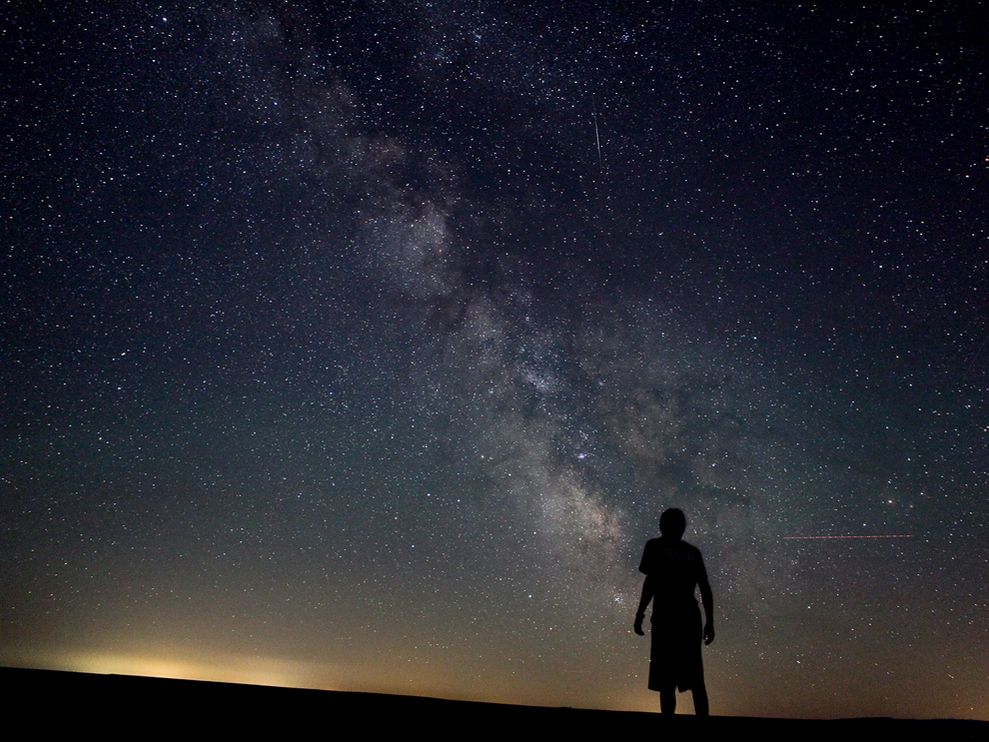Derek Kidner suggests that “this psalm is an unsurpassed example of what a hymn should be, celebrating as it does the glory and grace of God, rehearsing who he is and what he has done, and relating us and our world to him; all with a masterly economy of words and in a spirit of mingled joy and awe” (65-66). From the highest heaven to the lowest earth God’s majestic glory is declared, made known and acknowledged.
The theme of the psalm concerns the greatness and goodness of God and the small but significant human. In light of the vastness, glory and intricacy of creation the psalmist is compelled to ask, “What is man that you take thought of him?” The focus of the psalm on the great and special privilege given to humanity occurs within the overarching focus on the sovereignty and majesty of God which frames the psalm in verses one and nine.
It is perhaps significant here, that this psalm does not teach a kind of natural theology or revelation (see Craigie). That is, humanity cannot ascertain its own true nature, nor its creational task, by looking at the world of nature. We may be awed by the splendor of nature, but it does not communicate a divine word to us; for that, we need the revelation of God’s name which is proclaimed in all the earth, and the revelation given to us in Scripture, for the psalm itself includes a meditation on the word of Scripture given in Genesis 1.
The comparison between God and humanity may be extended. God’s glory and majesty is inherent, revealed in the vast and mighty work of creation. The creation, which is so great that we are dwarfed in comparison, is but the work of God’s fingers. The greatness of God far surpasses the greatness of creation! Nevertheless, the glory of the heavens evokes praise, so that even children are aware of God’s awesome greatness – to the shame of those who would repudiate God’s existence, rule and justice.
Humanity’s glory, in contrast, is derivative, bestowed by God in the act of creation as the crown of all God’s creatures, and in the constant remembrance by which God calls the human creature to mind. This is a dignity given by grace, a dignity given to every person, and constantly renewed as each person is the object of God’s particular care and concern. Amongst all the creatures, only humanity is crowned with glory and majesty.
Verses six through eight indicate the creational task given to humanity: to “rule” over the works of God’s hands. This task echoes the creational ordinance of Genesis 1:26, 28. Created in the divine image, humanity is to rule over the other living beings. It is crucial that this text be understood within the cultural milieu in which it was written. Biblical scholars suggest that the creation stories picture the world and all its creatures as a temple for the praise of God’s glory. Humanity in God’s image are a priesthood within this temple charged with the task serving and caring for this temple, representing God to the creatures, and offering acceptable worship to the creator.
This vision of priestly stewardship has, of course, been drastically altered by the reality of the Fall, so that even creation has been implicated and altered in humanity’s turning away from God. Indeed, as the author of the letter to the Hebrews plainly notes, “But now we do not yet see all things subjected to him. But we see Jesus…” (Hebrews 2:8-9).
The New Testament clearly and unambiguously applies this psalm to Jesus Christ, both here in Hebrews and elsewhere. Humanity in general has failed in its creational task and forfeited its distinguished role. But Jesus Christ has come as the truly human person, and in his incarnation, suffering and death, was made for a time “lower than the angels,” but now is crowned with glory and honour. The One who tasted death for all has now been so exalted that all things are under his feet (Ephesians 1:22; 1 Corinthians 15:25-27). Jesus himself cited this psalm on the day of his triumphant entry into Jerusalem when the children cried out, “Hosanna to the Son of David!” (Matthew 21:15-17).
Jesus Christ is the “real humanity,” the true “Son of Man” in both the earthly and eschatological sense. In our place and on our behalf he has taken and borne human weakness and fallenness in order to redeem us and restore us to a position in which we share his glory, honour and dominion. Authentic humanity is fully and truly realised in Christ, and we find our identity and destiny in him. By the Spirit believers are being renewed and transformed into his image, restored to truly human life and existence (see 1 Corinthians 15:49; 2 Corinthians 3:17-18; Ephesians 4:20-24; Colossians 3:8-11).
True human being and identity is a christological and eschatological reality.
